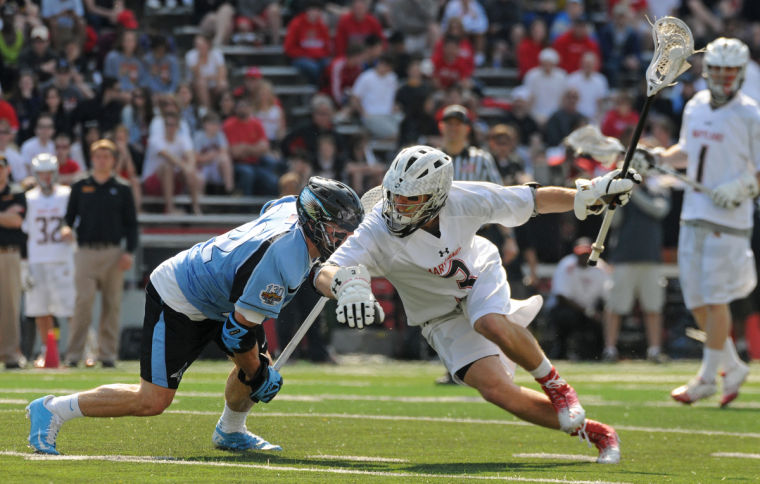
Jake Bernhardt
Niko Amato sat drenched in sweat in a pressroom at Loyola’s Ridley Athletic Complex on Feb. 23 after his Terrapins men’s lacrosse team beat the defending national champion Greyhounds, 12-10.
The goalkeeper’s voice was raspy from exhaustion, but he was able to mutter what would become a mantra for the Terps through the first half of their season.
“No one’s ever satisfied being a winner in March and February,” Amato said after the 2012 title game rematch. “Our bar is set for national championships.”
Teammates and coaches echoed Amato’s sentiment during the Terps’ blistering 6-0 start to the season and ascent to the top of the national polls. The Terps had been to two straight championship games, and they seemed poised for another return on Memorial Day.
But as the year wore on, the Terps’ season followed an entirely different trajectory than Amato had hoped for.
As its offense sputtered, the team’s early-season success faded. The Terps peaked in March, and when it came time to compete for a championship, they fell to Cornell, 16-8, on May 12 in the NCAA tournament’s first round.
That was the Terps’ third loss in five games, and it capped a steep plummet from the nation’s top-ranked squad to an uneven team that fell short of a national championship for a 38th straight year.
“There were times [this season] where we were really locked in and we were in a groove and things were great,” coach John Tillman said. “But then there were also times we were very inconsistent.”
Through their first six games, the Terps averaged 15 goals per game and outscored opponents by more than eight goals per contest. The run even included back-to-back road wins over NCAA tournament teams — the victory over Loyola and a 16-7 rout at eventual national champion Duke.
A balanced offense combined with a stifling defense — anchored by All-Americans Amato and long pole Jesse Bernhardt — to create a cohesive and seemingly dominant team.
“Guys have really sacrificed for each other, and guys have been willing to do things to help the team win,” Tillman said after the Terps’ victory over the Blue Devils.
Eventually, the circumstances started to turn. On March 23, the Terps struggled against North Carolina in a 10-8 loss, their first pitfall of the season.
Though the Terps won their next two contests, the team didn’t alleviate its offensive concerns. It squeaked out wins over Virginia and Navy — two teams that missed the NCAA tournament — by a combined five goals. The comfortable blowouts the Terps had experienced early in the season were gone.
On April 13, the Terps’ issues hit a new low in a 7-4 home loss to rival Johns Hopkins. Tillman seemed baffled. How could his team, which averaged more than seven goals per half through the first six games, muster a season-low four goals against its archrival?
The Terps were again humbled by a 13-6 loss to a reeling Virginia team in the ACC tournament semifinals two weeks later. The offense had completely fallen apart. After scoring at least 12 goals in each of their first five games, the Terps couldn’t reach that mark even once in their next seven.
Previously perceived as a balanced attack — six Terps scored at least 17 goals on the season, but none scored more than 23 — the team’s lack of a go-to scorer haunted them late in the year.
“Early in the season … it was a little easier than maybe we expected,” Tillman said after losing to the Cavaliers. “We talked a little bit in the locker room about creating the right identity for this team.”
The Terps finally found a semblance of their early-season form in an 18-6 Senior Day thrashing of Colgate. Attackman Kevin Cooper and midfielder Mike Chanenchuk — the Terps’ top two points leaders — combined for 10 points, and the squad earned its first comfortable win in nearly two months.
But the Terps’ three regular-season stumbles forced them into a first-round matchup with the Big Red, which boasted a potent 12-3 record at the time. The Terps surrendered a season-high 16 goals to the eventual semifinalist in a blowout loss and were bounced from the NCAA tournament.
The Terps could still find positives from the season after their fate was sealed. They tied for tops in the nation with seven All-Americans and won at least 10 games for the 11th straight year. They’ll return four of those All-Americans and a host of contributors to make another run at a title next year, too.
Still, after the season came to a close against the Big Red, the Terps couldn’t help but think back to Amato’s words from February.
The first two months of the campaign produced so much success and evoked so much promise. But that didn’t matter. The Terps wanted to succeed at the end of the season, when it mattered most. But they couldn’t quite do it.
“I think Niko said it best: You don’t win championships in February and March,” Bernhardt said after the loss to Cornell. “You always have that second season, and this May was supposed to be that second season.”
sportsdbk@gmail.com



